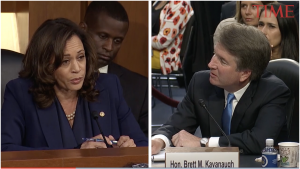LISA GRAVES, Lisa at documentedinvestigations.org, @thelisagraves
Graves just co-wrote the piece “Brett Kavanaugh Can’t Be Trusted. We Know Because We Worked as Counsel to Senators When He Was in the Bush White House” for Time magazine. She also recently wrote the piece “I Wrote Some of the Stolen Memos That Brett Kavanaugh Lied to the Senate About” for Slate.
She is the former chief counsel for nominations for the ranking member of the Senate Judiciary Committee and was deputy assistant attorney general in the Department of Justice. Graves is the co-founder of Documented, which investigates corporate influence on democracy.
She writes that Kavanaugh should be removed from his current judgeship “because he was repeatedly asked under oath as part of his 2004 and 2006 confirmation hearings for his position on the U.S. Court of Appeals for the D.C. Circuit about whether he had received such information from [GOP Senate aide Manuel] Miranda, and each time he falsely denied it.
“For example, in 2004, Sen. Orrin Hatch asked him directly if he received ‘any documents that appeared to you to have been drafted or prepared by Democratic staff members of the Senate Judiciary Committee.’ Kavanaugh responded, unequivocally, ‘No.’
“In 2006, Sen. Ted Kennedy asked him if he had any regrets about how he treated documents he had received from Miranda that he later learned were stolen. Kavanaugh rejected the premise of the question, restating that he never even saw one of those documents.
“Back then the senators did not have the emails that they have now, showing that Miranda sent Kavanaugh numerous documents containing what was plainly research by Democrats. Some of those emails went so far as to warn Kavanaugh not to distribute the Democratic talking points he was being given. …
Graves writes: “He lied. Under oath. And he did so repeatedly.
“Significantly, he did so even though a few years earlier he had helped spearhead the impeachment of President Bill Clinton for perjury in a private civil case. Back then Kavanaugh took lying under oath so seriously that he was determined to do everything he could to help remove a president from office.
“Now we know that he procured his own confirmation to the federal bench by committing the same offense. And he did so not in a private case but in the midst of public hearings for a position of trust, for a lifetime appointment to the federal judiciary.” See recent New York Times piece “Brett Kavanaugh Urged Graphic Questions in Clinton Inquiry.”
